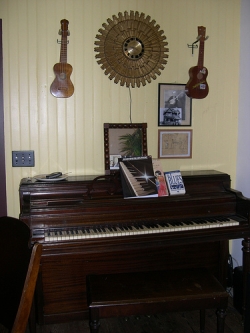
Most teachers agree that the home environment is critical for young musicians. "It affects motivation, effort, persistence, and achievement,” says John McCarthy, director of the Preparatory Division at the San Francisco Conservatory of Music. How can you make your home music friendly?
The simple act of playing music together is a fundamental first step, but when it comes time for true practicing, Doris Fukawa, executive director of Berkeley’s Crowden Music Center, recommends a graded approach based on age. For families with young children, simply singing and playing music is sufficient. “Anything with a good melody and moderate beat is great,” she says. As for instruments, Fukawa says a piano is terrific; a guitar is okay with proper handling, but stay away from anything amplified. Older children taking lessons should have a consistent practice time, which Fukawa says can be as little as 10 minutes in the morning and 20-30 minutes after school.
"A music-friendly home will have a quiet space that is always free during the planned practice time,” McCarthy notes. Stephen Shapiro, executive director of the Community Music Center of San Francisco, cautions, “Don’t make practicing a chore, or a battleground. Make it fun if possible, and part of the daily routine.” Shapiro further emphasizes that parents should “make sure the student’s music and instrument are in good working order, and help her get to the lesson on time.”
“Make sure the rest of the house is reasonably quiet when the student is practicing,” Shapiro advises. McCarthy adds, “A healthy emotional climate is fundamental. This is more important that considerations of privacy, the quality of the instrument, etc. Parents who are authoritarian are actually more likely to inhibit their child’s practice and performance.”
Finally, the sheer act of listening enhances the home musical environment. Both Shapiro and Fukawa stress the importance of frequent listening and going to concerts together, classical or otherwise. Eventually, parents can sense the direction of their child’s musical interest and go from there. Fukawa notes, “My son Sasha is playing piano, and has snuck in learning how to play a part of the ‘Star Wars theme,’ which he enjoys playing for his friends. When the ‘habit’ takes, then families/teachers can increase the rigor. Knowing how your children thrive and learn is also part of the equation.”

